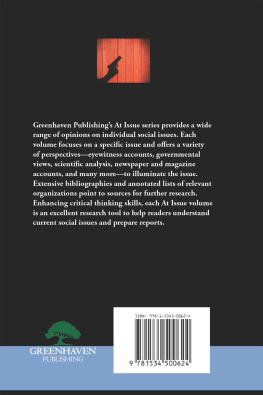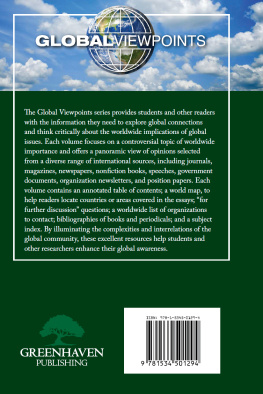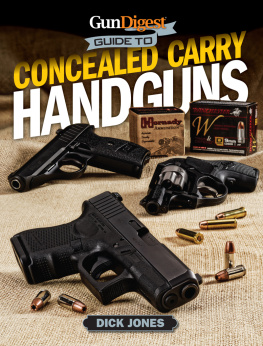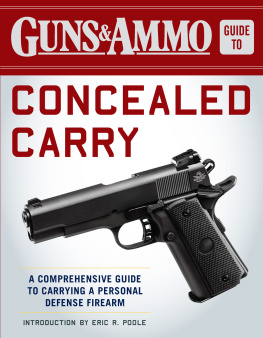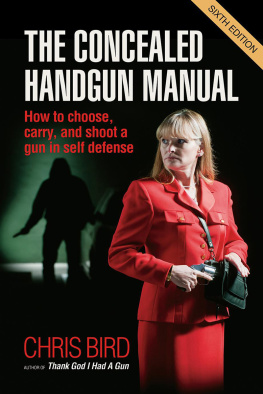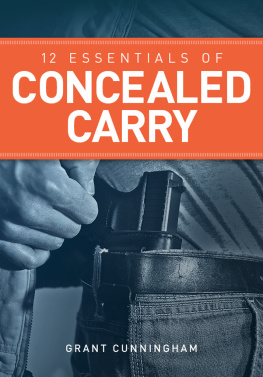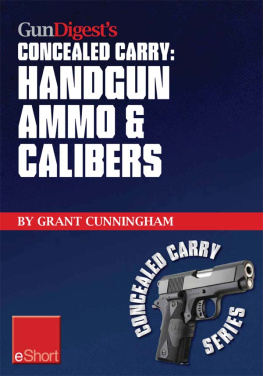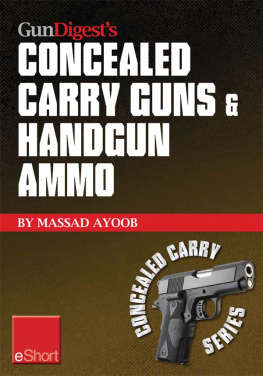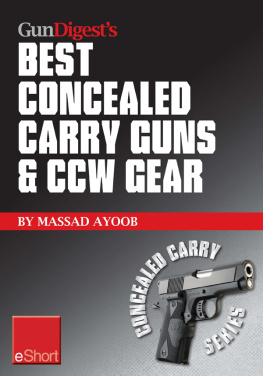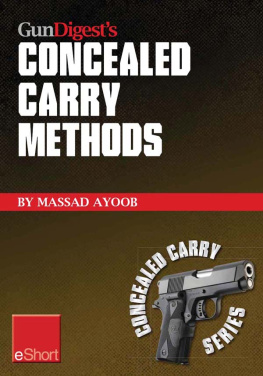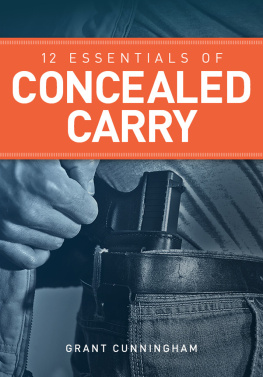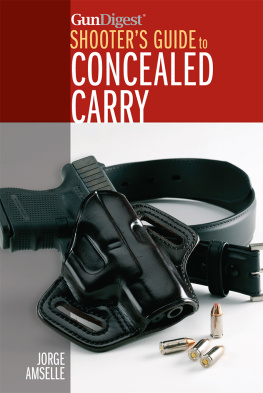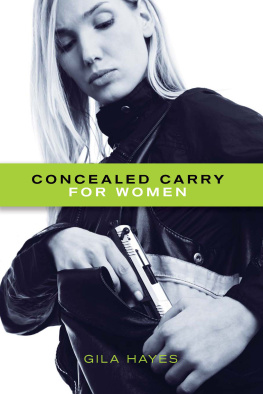Guns: Conceal and Carry
Other Books in the At Issue Series
Are Graphic Music Lyrics Harmful?
Banned Books
Bilingual Education
Campus Sexual Violence
Caffeine
Can Diets Be Harmful?
Childhood Obesity
Civil Disobedience
Corporate Corruption
Domestic Terrorism
Environmental Racism
Gender Politics
The Right to a Living Wage
Trial by Internet
When Is Free Speech Hate Speech?
Guns: Conceal and Carry
Anne Cunningham, Book Editor
Published in 2018 by Greenhaven Publishing, LLC
353 3rd Avenue, Suite 255, New York, NY 10010
Copyright 2018 by Greenhaven Publishing, LLC
First Edition
All rights reserved. No part of this book may be reproduced in any form without permission in writing from the publisher, except by a reviewer.
Articles in Greenhaven Publishing anthologies are often edited for length to meet page requirements. In addition, original titles of these works are changed to clearly present the main thesis and to explicitly indicate the authors opinion. Every effort is made to ensure that Greenhaven Publishing accurately reflects the original intent of the authors. Every effort has been made to trace the owners of the copyrighted material.
Cover image: AVN Photo Lab/Shutterstock.com
Library of Congress Cataloging-in-Publication Data
Names: Cunningham, Anne C., editor.
Title: Guns: conceal and carry / edited by Anne C. Cunningham.
Description: New York : Greenhaven Publishing, 2018. | Series: At Issue | Includes bibliographical references and index. | Audience: Grades 9-12.
Identifiers: LCCN ISBN 9781534500624 (library bound) | ISBN 9781534500600 (pbk.)
Subjects: LCSH: Firearms--Law and legislation--United States--Juvenile literature. | Gun control--United States--Juvenile literature.
Classification: LCC KF3941.G867 2018 | DDC 344.730533--dc23
Manufactured in the United States of America
Website: http://greenhavenpublishing.com
Contents
Introduction
Guns Will Affect Classroom Interactions
Jonathan M. Metzl
Concealed Weapons Should Be Allowed On Campus
Michael Newbern
Guns In School Do Not Prevent Crime
Evan DeFilippis
Concealed Weapons Deter Crime
John R. Lott, Jr.
Guns Will Change the Character of Higher Education
Steven J. Friesen
Firearm Self Defense Legality
Lauren Baldwin
Concealed Carry Prevents Shootings
Crime Prevention Research Center
Should Applicants Provide Reasons for Wanting a Concealed Weapon?
Joseph Blocher
Background Checks And Mental Illness: Facts and Myths
Denise-Marie Ordway
Balancing Gun Rights And Public Safety On Campus
Thomas L. Harnisch
Students May Threaten Professors for Better Grades
Jessica Smartt Gullion
More Gun Availability Means More Crime
Irshad Altheimer
Explaining Mass Shootings
John Wihbey
We Should Be More Skeptical About Gun Control
David B. Kopel
Fear Is a Threat to Learning
Jeffrey Alan Lockwood
Organizations to Contact
Bibliography
Index
Introduction
A mericans have an abiding and emotional relationship with guns. The option to keep a gun for hunting or self-defense is a constitutionally protected and deeply cherished right, but does this mean that gun owners should be permitted to bring their guns to any public space, at any time? Are laws banning guns from sensitive areas such as schools and government buildings constitutional and in the public interest? Should states require concealed weapon permit seekers to demonstrate a compelling reason why they wish to carry a gun, and if so, what reasons qualify as valid? These and other similarly thorny questions pertaining to concealed carry comprise an especially controversial subset of contemporary gun law and policy. Indeed, experts such as Joseph Blocher, from whom we will hear in the pages that follow, identify concealed carry as the most important field within the larger debate over gun rights and restrictions.
The purpose of this book is to examine the concealed carry debate from a variety of angles and viewpoints. It includes articles representing a wide range of ideological and political positions. Some writers advocate virtually unfettered rights to carry concealed weapons. Others present anecdotal and statistical evidence to the contrary, supporting common sense limits on where gun owners can take their weapons for the sake of public safety. If we step back and view this discussion from a more general perspective, the debate over concealed carry reveals familiar tradeoffs between individual liberty and the public good. Since vastly different interpretations emerge as to how best to balance these prerogatives, an in-depth understanding of multiple perspectives on the concealed carry issue is crucial to reaching an informed position.
Despite daily reports of injuries and fatalities by firearms, to say nothing of the brutal spate of high profile mass shootings in recent years, majority support for gun rights in this country remains steadfast. According to recent opinion polls conducted by Pew Research Center, 52% of those surveyed wish to protect the right to own a gun absolutely. By contrast, only 46% support new restrictions on gun ownership. This divide is starkly polarized politically. 79% of Democrats support gun control measures, while a staggering 90% of Republicans favor broad gun rights with minimal restrictive legislation. Some bipartisan support exists for common sense gun laws including universal background checks, a ban on assault weapons, and restrictions for those on federal terror watch and no fly lists from owning guns. Contrary to the desires of the co-called no compromise gun lobby, this indicates that Americans share common ground regarding the impact of widespread gun availability on public health and safety.
Dating back to 1791, the Second Amendment of the U.S. Constitution provides a foundational text for gun rights advocates. It is supported by the majority of the population, and is unlikely to see repeal. Nonetheless, this amendment is both brief and notoriously vague, and has therefore been subject to varying interpretation over the years. Moreover, even legal scholars disagree over how precisely to interpret the provision for a well-regulated Militia given the obvious differences between late eighteenth century America and todays highly professionalized and technologically powerful military.
In the landmark 2008 case District of Columbia v. Heller, the Supreme Court ruled 5-4 that the right of the people to keep and bear Arms protects the individuals right to own a gun, rather than any collective right to form militias. Although the court ruled conclusively that citizens are permitted to own guns for traditional reasons such as sport and self-defense, the decision also contained a carefully worded statement that the Second Amendment does not confer a right to keep and carry any weapon whatsoever in any manner whatsoever and for whatever purpose. Thus, under the

